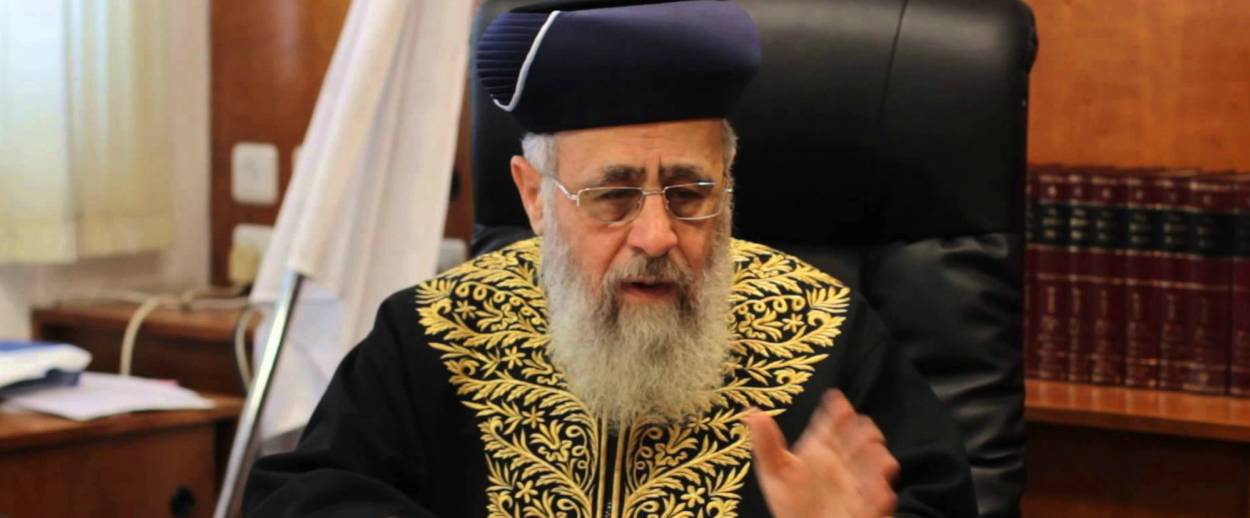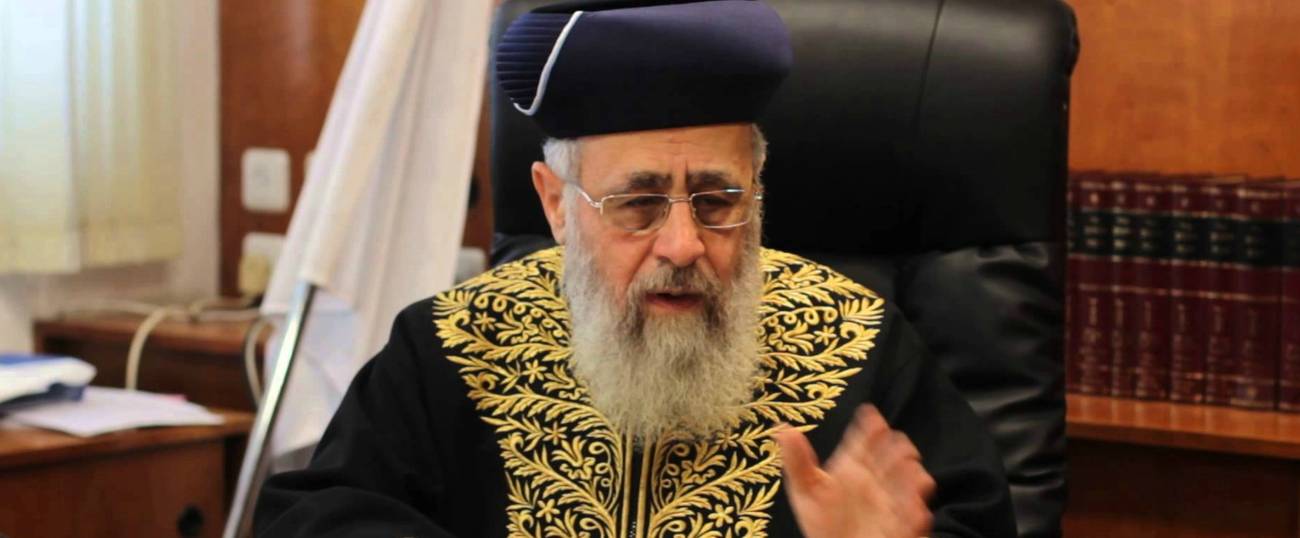Israeli Chief Rabbi Calls African-Americans ‘Monkeys’
And now it’s up to us to show him the full extent of our disdain and disgust




Some sermons are better left undelivered. Consider for example the wise words of Israel’s Chief Sephardic Rabbi, Yitzhak Yosef, who at his weekly lesson at Jerusalem’s Hayazdim synagogue last Saturday night chose to riff on the Meshaneh HaBriyot blessing. “When one sees strange creatures, one recites Meshaneh HaBriyot,” said the rabbi. “When one sees a kushi, one recites Meshaneh HaBriyot.” The word kushi meant a black person when it was first used in the bible, and still means the same today, except that some decades ago it morphed into a racial slur, not a word to be used in polite company, nor, for that matter, by Israel’s Chief Rabbi, with his annual NIS600,000 paycheck footed entirely by tax payers.
Back to the sermon. Not all black people, apparently, are rare enough to warrant such a blessing. Which kushi does justify the blessing, asked the Rabbi? “Someone whose father and mother are white, and he came out a kushi,” he answered himself. “You walk down the street in America, every five minutes you see a kushi. You’ll recite Meshaneh HaBriyot? You need a kushi with a father and mother who are white. If, you know, their son came out a monkey, their son came out like that, then you’ll recite Meshaneh HaBriyot.”
After Ynet broke the story, the Chief Rabbi’s office said that Yosef was merely quoting the Talmud. Yes, the Berakhot tractate does instruct us to recite the blessing when encountering people with particularly red, white or black skin–along with very short or very tall people–and, some 1,500 years ago, did indeed use the word kushi. The Talmud, rather charmingly, even advises we say the blessing when first encountering an elephant or monkey. But the Talmud did not use a racial pejorative, nor did it equate black people with monkeys. No, we needed the 21st century rabbinical genius of Yitzhak Yosef for that.
Thus far, the responses have been muted. Chief Rabbi Yitzhak Yosef is the son of the late Rabbi Ovadia Yosef, and like his father before him, he is prone to bizarre and offensive off the cuff remarks. The elder Yosef, though, was a brilliant man, and his often-brave halachic rulings temper the long list of deeply inappropriate quotes he left behind. Yosef Jr.’s legacy will be decidedly less complicated. During his short tenure as Chief Sephardic Rabbi, he’s managed to offend pretty much anyone who is still paying attention: women (whose most senior job in wartime is cooking for soldiers), non-Jews (who shouldn’t be allowed to live in the land of Israel), the IDF (after Yosef voiced his support for another rabbi who recommended the IDF Chief of Staff be sacked for the integration of women in combat roles), and so forth.
Some five years ago, Rabbi Yosef’s Ashkenazi counterpart, Rabbi David Lau, caused a fracas when he referred to the black players in the Maccabi Tel Aviv basketball team as kushim. After I wrote about it for Tablet, my friend and colleague Yair Rosenberg countered with a piece suggesting that Rabbi Lau may not have known that he was committing a major faux-pas. After quoting at length arguments made by Yaacov Lozowick, Israel’s chief archivist, Rosenberg summarized that “Lau’s sin here may not be racism, but rather his complete disconnection from the broader cultural universe of most Israelis. To him, kushim is a biblical term. To most of his listeners, it’s a racial slur.” Repellent rabbinical remarks have spawned a cottage-industry of apologias, and like many of them, this one read like science fiction. After all, Lau served as a chaplain in the IDF’s intelligence corps, and was discharged as Major. Prior to his appointment as chief rabbi, he served as the rabbi of Shoham and Modi’in – both largely secular towns. Lau’s immersion in Israeli society could not have been much greater. While Yitzhak Yosef’s biography is more traditionally orthodox and cloistered, to suggest total obliviousness on his part would be letting him off too easy.
Political correctness is not the institution here that it is in the United States. The Academy of the Hebrew Language has yet to suggest good Hebrew translations for words like microagression. Purim costumes generally go unpoliced by Israeli universities. But none of that means that the Chief Rabbis of this country – public servants both – should be allowed to spew casually, unabashedly racist remarks. Bemoaning Palestinian anti-Semitic incitement, Prime Minister Netanyahu told UN Secretary General Ban Ki-moon that “it’s very hard to habituate and prepare the next generation for peace when they’re told that Jews are the descendants of pigs and monkeys.” As the Israeli government prepares to deport thousands of African asylum-seekers, it’s easy to understand why the public discourse on what is undoubtedly a complicated issue has been so shallow, when the public is told by its Chief Rabbi that black people and monkeys are one and the same.
It would be easy to write Yitzhak Yosef off as Israel’s problem. We opted not to separate synagogue and state, and now we must deal with the consequences. But though the Chief Rabbinate is a uniquely Israeli phenomenon, it sets the tone on matters of paramount importance for Jews the world over, most prominently the question of whether or not Israel will ever truly recognize non-orthodox flavors of Judaism. At the very least, those in the American Jewish community who are quick to demand, whenever anti-Semitic comments are made by leaders who should know better, that the offender apologize and that his followers denounce him, should give Israel’s Chief Rabbi a live demonstration of true Jewish ethics.
Tal Kra-Oz is a writer based in Tel Aviv.